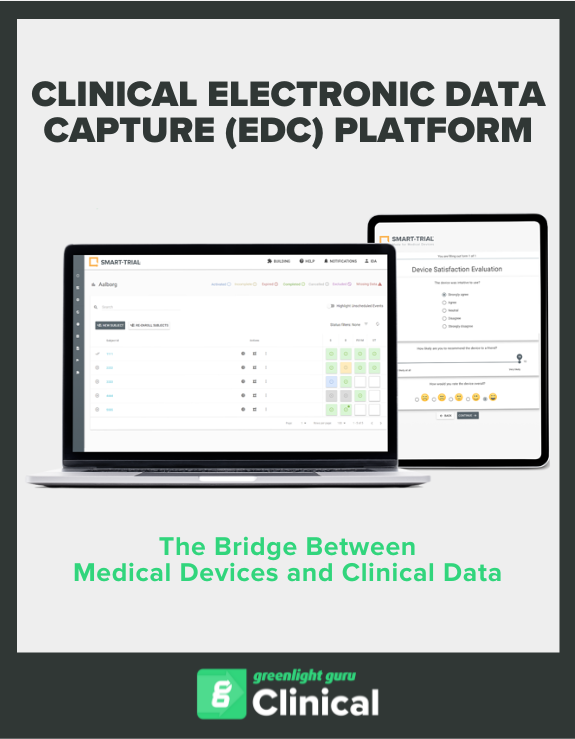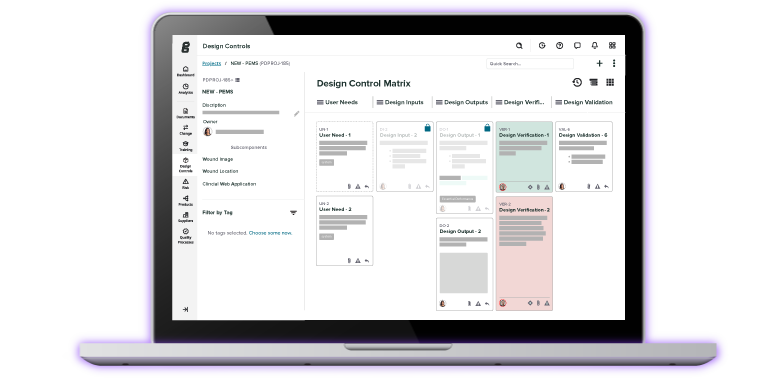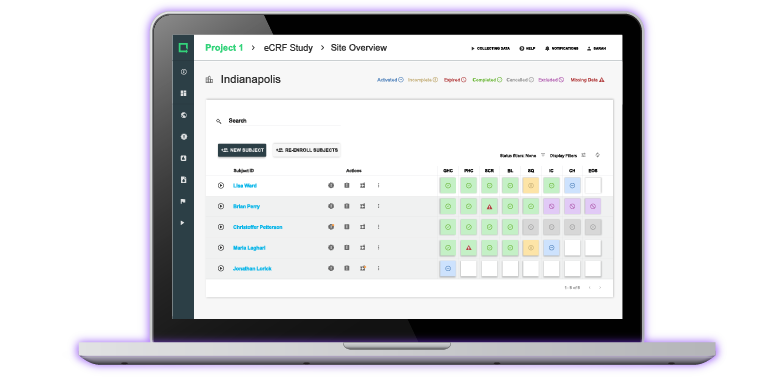Get Compliant Clinical Data with Investigator-Initiated Studies

The number of Investigator-Initiated Studies (IIS’s) conducted globally is on the rise. Independent patient-focused clinical studies led by physicians play an integral role in improving and expanding patient care in the real world.
That is because, unlike industry-sponsored studies, they focus on a different set of scientific questions, regardless of their commercial value.
Due to the fact that the Medical Device Regulation (MDR) has presented the industry with unprecedented challenges, clinical teams must utilize all available possibilities to generate and collect relevant data to comply.
In this blog, we highlight and discuss the role of IIS as a tool for MDR compliance as well as what you need to know and keep top of mind as an SME and a bigger manufacturer.
What is the definition of Investigator-Initiated Studies?
Investigator-Initiated Studies (IIS’s) are clinical studies/investigations initiated by investigators. The main difference from regular studies is that the investigator assumes the role of the Sponsor. Additionally, taking on the responsibility of complying with the regulations.
Roles
Investigator -> According to the MDR, an Investigator is an individual responsible for the conduct of a clinical investigation at a clinical investigation site.
Sponsor -> According to the MDR, the Sponsor is defined as any individual, company, institution or organization that assumes responsibility for the initiation, including management and arrangement of financing the clinical investigation.
What are the main advantages of IIS for medical device manufacturers?
When it comes to the use of investigator-initiated studies, Medical Device manufacturers have different approaches. For Start-ups and SMEs, these types of studies are a valuable and indispensable tool to collect clinical data at relatively low costs, as oftentimes these companies rely on them for critical clinical evidence on safety and performance.
On the other hand, bigger manufacturers use them for “less” significant or risky studies that can add to their Marketing claims.
No formal responsibility
As the Investigator assumes full responsibility for the study, they need to handle patient recruitment and get the study running as fast as possible. Removing any "formal responsibility" from the manufacturer. This means that investigator-initiated trials or studies hold less direct risk for the sponsor.
Low-cost
Investigator-initiated studies are less costly as much of the upfront work is performed by the investigator, who might also have access to softer funding and can donate facilities and staff to the conduct of the trial as their primary purpose is to produce a scientific publication on the research hypothesis.
Flexibility in design
These trials tend to be much more driven by daily practice than industry-sponsored clinical studies under a strict protocol and therefore should be seen as complementary in the complete clinical evidence package.
Real-world evidence
Investigator-initiated studies have the added benefit of creating relationships with investigators with research expertise, providing valuable insights into unmet patient and physician needs that can potentially improve the device.
No intervention from industry
The ideas received from independent researchers can be a source of valuable new claims for safety and performance. Additionally, because of the potential independence of the researcher, the outcomes can truly impact healthcare as it includes the views of the patients.
What are the main challenges?
As a manufacturer, you have less control over the research hypothesis and study format. If you're unsure how the data is collected or if they're not following the medical device clinical trials ISO standard, you risk non-compliant data. This means that it cannot be used.
Additionally, depending on the investigator’s experience and in-house resources or scientific support, they typically lack the appropriate access to compliant Electronic Data Capture (EDC) tools, statistical analysis professionals, and medical writing professionals.
Legal Risk
It is extremely important to have a well-functioning system set up to handle the incoming proposals for investigator-initiated trials, as proposals contain study ideas/concepts. These can be considered “Intellectual Property” and therefore must be accessed carefully to eliminate any overlap/duplication.
Ethical Risk
A major ethical concern is the presentation of the research and its outcomes as being performed independently of the Medical Device company when they might not have been. Companies need to hold themselves to the highest ethical standards and avoid situations that can be considered as an intervention on the part of the manufacturer.
Financial Risk
The decision to support an investigator-initiated study should be well thought through. Identify and clarify the study's goal early on to align with business strategy. In that way, you can avoid potential clinical outcomes that can eventually affect sales.
Other aspects to consider when conducting Investigator-Initiated Studies
Below we are listing a few more things to consider when planning to conduct investigator-initiated studies (IIS).
Payments and other support from the industry
The industry can support investigator-initiated trials or studies with study funding. More established manufacturers have structured funding programs with well-defined application processes.
However, MedTech Europe has published a guideline - MedTech Europe Code of Ethical Business Practice, in which their advice is for the industry to make payments after the investigator has obtained an Ethical Committee approval. This ensures that the arm's length principle is held.
Furthermore, manufacturers can provide investigators with other support like:
-
Free devices
-
Statistical Analysis programs/services
-
Protocol writing
-
Medical writing
-
ISO 14155 training and so on.
Choose your investigators wisely
Selecting the right investigator to partner with is the key to success. Be firm in asking about their study track record and if they are operating within an academic institution that can support the study.
Many European university hospitals have their own clinical trial units where investigators can get support on some of the “downsides” previously listed. Furthermore, you should seek references from other industry actors on the investigator’s performance.
Data ownership and access
The medical device manufacturer should ensure access to the raw study data (or raw study results at a minimum) for inclusion in their technical files. The data is not only useful from a regulatory standpoint but also for future developments of new studies or hypotheses on your device.
Make sure to assist the investigators with their informed consent form to include statements on the usage and sharing of anonymized data after the study ends, and in some cases pseudonymized data during the study.
The importance of a good Clinical Trial Agreement (CTA)
The CTA should contain all the support given by the manufacturer to the investigator during the study. Furthermore, it should clearly state how and when payments are made. It is a huge benefit to base payments on milestones such as recruitments or data completion ratios.
The CTA should include paragraphs on how and when the manufacturer will get access to the raw study data and draft manuscript(s). For example, through direct access to the EDC tool with appropriate user permissions.
Furthermore, the CTA should demand a minimum of one publication from the study. The study should be registered in an international database (such as clinicaltrials.gov or similar international databases).
Now that you have a clearer understanding of what you need to consider when conducting investigator-initiated studies or trials, the question remains on whether this can help you generate the clinical data you need to comply with the MDR.
Using data from investigator-initiated trials or studies to help comply with the MDR
Investigator-initiated trials can be a vital part of the clinical data strategy for MDR compliance. However, relying solely on them can be risky. The benefits of using IIS depend on the characteristics/device/class/life-cycle stage of each device.
Furthermore, they will most likely have a bigger impact on startups than established manufacturers. The risk here is non-compliant data. If you're not sure how the data is collected or if the necessary standards were applied, this means that it cannot be used in your clinical evaluation report.
If you intend to use the information collected from an investigator-initiated trial in your clinical evaluation you need to make sure that the relevant standards were applied. Standards like clinical investigation (ISO 14155) and risk management (ISO 14971). You can expect to get questions from Notified Bodies on how the data was collected and how it complies with necessary requirements.
If you have not worked with investigator-initiated studies before, you might want to start out with something “easy”. Managing these stakeholders can be a lot of work. It can be difficult to know how far manufacturers can go to avoid assuming the role of a sponsor.
And thereby making the study too expensive and risky for it to be an investigator-initiated study. Furthermore, MedTech CROs can be extremely helpful to ensure regulatory compliance and data quality. Often, the investigator will be relieved to have the support of industry professionals to run the study.
Can clinical data collected from Investigator-Initiated Studies be effective in MDR compliance?
The short answer is yes.
In order to maximize your returns from supporting IIS as a manufacturer, you should choose your investigators wisely. Investigators should be well-informed and trained. The studies should align with your business strategy, and manufacturers need to manage the expectations of the collaboration closely.
This then makes IIS a valuable source of clinical evidence for medical device manufacturers.
Manage data collection for your medical device clinical investigation with Greenlight Guru Clinical
Greenlight Guru Clinical is the first and only data gathering and management system that’s purpose-built for medical devices and diagnostics.
With Greenlight Guru Clinical, medical device companies can create customized eCRF forms and digitize data collection for clinical investigations, in-human studies, and post-market surveillance activities.
Greenlight Guru Clinical is out-of-the-box compliant with ISO 14155:2020 and includes templates for data collection planning and regulatory compliance that help medical device companies execute organized, cost-effective, and compliant studies that bring products to market faster.
Ready to Learn More? Contact us for a customized demo.
Jón Ingi Bergsteinsson, M.Sc. in Biomedical Engineering, is the co-founder of Greenlight Guru Clinical (formerly SMART-TRIAL). He was also the technical founder of Greenlight Guru Clinical where he paved the way for the platform’s quality standards, data security, and compliance.









